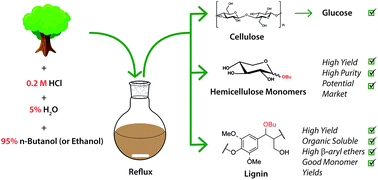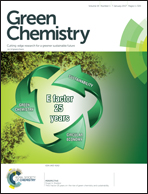Pre-treatment of lignocellulosic feedstocks using biorenewable alcohols: towards complete biomass valorisation†
Abstract
Here, we report on the ability of the biomass derived solvents ethanol and, in particular, n-butanol to fractionate lignocellulose into its main components. An organosolv system consisting of n-butanol containing 5% water and 0.2 M HCl at reflux was found to remove effectively the lignin and hemicellulose components of lignocellulosic biomass leaving a cellulose pulp suitable for enzymatic hydrolysis to simple sugars. Using a hardwood beech pulp as an example, essentially complete conversion of the cellulose component to reducing sugars was achieved with a cellulase loading of 22 FPU per g. Analysis of the solubilised hemicellulose fractions revealed that they consist almost exclusively of alkyl xylosides and mannosides which could serve as valuable synthetic building blocks. Additionally, the mild conditions (<120 °C) and high alcohol content of the pre-treatment solvent suppressed lignin degradation reactions and allowed for the isolation of high quality lignins in good yields. Detailed HSQC NMR analysis of the isolated lignins revealed that they still contained large amounts of β-aryl ether units, especially α-ethoxylated and α-butoxylated β-O-4 units, making them particularly suitable for depolymerisation to mono-aromatic chemicals. This was demonstrated using a recently reported acidolysis method utilizing ethylene glycol which gave monomer yields of between 7.4 and 18 wt%. The yields for n-butanol lignins were at least four fold higher than those obtained from a current generation technical organosolv lignin under comparable conditions.



 Please wait while we load your content...
Please wait while we load your content...